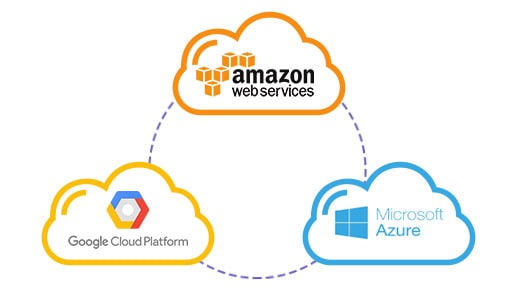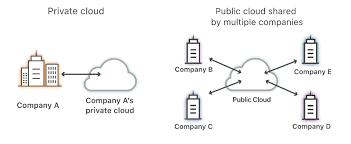Understanding the Public Cloud and its 04 basic features
In the earlier articles, Cloud Space mentioned to you what is the virtual private cloud and how it compares with a dedicated private cloud or traditional private cloud. In this article, we will explain the definition of the public cloud and its benefits.
When we talk about the public cloud, what does it refer to? Well, if you focus on the term, public means accessible to all the users across the globe. Thus, a public cloud is an open system where storage or software are available for free or pay per usage models that can be accessed via the Internet. Some of the popular examples of public clouds include Amazon Elastic Cloud Compute(EC2), Google App Engine, Blue Cloud by IBM, and Azure services Platform by Windows.
However, whether it is public, private or hybrid cloud one fundamental principle follows for all of them and that is to encourage and promote virtual work environment over the existing physical one. It is different than other two models of cloud as the focus laid is upon general public than concentrating on a niche public.

The definition
The public cloud is defined as computing services offered by third-party providers over the public Internet, making them available to anyone who wants to use or purchase them. They may be free or sold on-demand, allowing customers to pay only per usage for the CPU cycles, storage, or bandwidth they consume.
Unlike private clouds, this model can save companies from the expensive costs of having to purchase, manage, and maintain on-premises hardware and application infrastructure – the cloud service provider is held responsible for all management and maintenance of the system.
Public clouds can also be deployed faster than on-premises infrastructures and with an almost infinitely scalable platform. Every employee of a company can use the same application from any office or branch using their device of choice as long as they can access the Internet.
While security concerns have been raised over public cloud environments, when implemented correctly, the public cloud can be as secure as the most effectively managed private cloud implementation if the provider uses proper security methods, such as intrusion detection and prevention systems (IDPS).
Microsoft Azure definition
Features
When compared with private or hybrid cloud, the public cloud has its own advantages and drawbacks. So it is your business requirements that will help approach in the right direction.

Public cloud caters to four basic characteristics that are as follows:
1. Inexpensive Setup
Public clouds like Google App Engine or Amazon elastic cloud compute have multiple data centers with the most modernized hardware and software. This gives you freedom for setting up or maintaining your own cloud environment and saves you largely on operational costs.
2. Freedom of Self Service
Public cloud vendors provide their APIs that encourage users to create a cloud on their own keeping in mind their needs. The only thing businesses that wish to opt for public cloud need to do is to visit public cloud portals and get started with it.
You don’t have to depend upon on any third party help to create or run this type of cloud. It will be managed and handled by you as you will be the prime proprietor of it.
3. Pay For What You Use (Pay-as-you-go)
The public cloud works on a utility model. This means you pay no additional charges except for what you use. This particular characteristic enables SMBs to save a lot on IT infrastructure during the initial stage of their operations. So you can deploy the cloud anytime and can shut it down after 2 hours; with this cloud model, there is no lock-in or contract.
4. Scalability & High Capacity
Public services work on the principle of ‘enough for everyone’. They allow you to upload as large objects as you want and you can always upscale or downscale your storage as per your defined conditions. So you have to no more worry about demand hikes and you are seamlessly available across the board.
How secure is it?
Although in public cloud security concerns are handled by the cloud provider yet is has been always a matter for consideration for IT professionals and researchers. Its a general perception that public clouds are less secure and data in them can be accessed by anyone.
This is the reason many businesses opt for managed cloud services that provide them the benefits of the public cloud while giving them a virtualized private environment. Apart from security, these managed service providers give you disaster recovery and data backup plans so that intense situations like cloud collapse or data crash could be handled or managed with ease and less effort.

Apart from security, these managed service providers give you disaster recovery and data backup plans so that intense situations like cloud collapse or data crash could be handled or managed with ease and fewer efforts.
To know more about our services, please contact Cloud Space for advice:
- Hotline: (+84) 86 980 5768
- LinkedIn: https://www.linkedin.com/company/cloudspacevn
- Website:
+ https://cloudspace.vn
+ https://hybridcloud.com.vn
+ https://publiccloud.com.vn